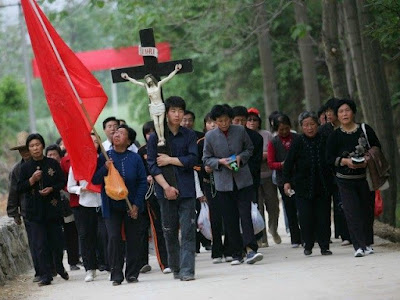"Freedom of religion in China is provided for in the Constitution of the People's Republic of China, with an important caveat: the government protects what it calls "normal religious activity," defined in practice as activities that take place within government-sanctioned religious organizations and registered places of worship. Although the dynastic governments of imperial China also claimed responsibility for the practice of religion, human rights bodies such as United Stat...es Commission on International Religious Freedom (USCIRF) have criticized this differentiation as falling short of international standards for the protection of religious freedom.
China's five officially sanctioned religious organizations are the Buddhist Association of China, Chinese Taoist Association, Islamic Association of China, Three-Self Patriotic Movement and Chinese Patriotic Catholic Association. These groups are afforded a degree of protection, but are subject to restrictions and controls under the State Administration for Religious Affairs. Unregistered religious groups—including house churches, Falun Gong, Tibetan Buddhists, underground Catholics, and Uyghur Muslims—face varying degrees of harassment, including imprisonment, torture, and forced religious conversion. Tam and Hasmath argue that the Chinese government views religion as potentially destabilizing...
A significant number of non-sanctioned churches and temples exist, attended by locals and foreigners alike. Unregistered or underground churches are not officially banned, but are not permitted to openly conduct religious services. These bodies may face varying degrees of interference, harassment, and persecution by state and party organs. In some instances, unregistered religious believers and leaders have been charged with "illegal religious activities" or "disrupting social stability." Religious believers have also been charged under article 300 of the criminal code, which forbids using heretical organizations to "undermine the implementation of the law." An extrajudicial, Communist Party-led security organ called the 6-10 Office oversees the suppression of Falun Gong and, increasingly, other unregistered religious organizations.
Folk religions, though not officially protected, are sometimes tolerated by authorities. The State Administration for Religious Affairs has created a department to oversee the management of folk religion..."
~ Wikipedia
Denise Long & I saw thousands of Falun Gong practitioners from all over the world, march in a parade along 42nd Street in New York. They went from the UN to the Chinese Consulate to demonstrate for freedom to meditate and practice qigong exercises.







No comments:
Post a Comment